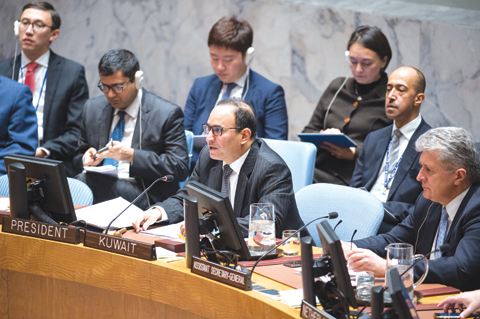Kuwait condemns acts against Rohingya minority
 NEW YORK: Kuwait’s Permanent Representative to the United Nations Ambassador Mansour Al-Otaibi speaks during a Security Council session
NEW YORK: Kuwait’s Permanent Representative to the United Nations Ambassador Mansour Al-Otaibi speaks during a Security Council sessionNEW YORK: The State of Kuwait has stressed the need to protect critical infrastructure from terrorist attacks, as they constitute easy and attractive targets for terrorist groups. "Threats to international peace and security are caused by terrorist acts," Kuwait's Permanent Representative to the United Nations Ambassador Mansour Al-Otaibi said, adding that "the importance of vital infrastructure lies in the fact that it is related to our daily lives, including many civilian facilities, telecommunications, emergency services, banking and finance."
"Each State had the responsibility to determine the concept of critical infrastructure and the best means to protect it," he said. "We in Kuwait are among the countries that have suffered the phenomenon of targeting vital infrastructure. Terrorists targeted a religious facility in 2015, which left scores of people dead and injured," he added.
He pointed out that the State of Kuwait has enacted a number of laws to prevent any terrorist activities against the critical infrastructure, which are consistent with relevant Security Council resolutions, including the law, in combating cyber-crimes. He pointed out that the law punishes anyone who has established a website for a terrorist organization or a terrorist person or published any information on the Internet to facilitate contacts with one of its leaders or members, to promote their ideas or to finance them.
He expressed Kuwait's keenness on supporting the Counter-Terrorism Committee Executive Directorate (CTED), urging member states to work together to facilitate technical assistance, and raising awareness in protecting vital infrastructure from terrorist attacks. He encouraged States to cooperate with the INTERPOL and the United Nations Office on Drugs and Crime (UNODC) in combating terrorism.
Moreover, Otaibi stressed the importance of implementing Resolution 2322 on international cooperation in combating terrorism and other relevant resolutions of the Council, pointing out that the State of Kuwait hosted Anti-IS Coalition ministerial meeting with the participation of 70 countries and four international organizations to develop strategies and plans to confront terrorism.
He said the meeting is the first since the defeat of (IS) in Iraq, adding that it is part of a series of international conferences that took place in order to build a formal coalition to destroy the IS, which had taken over large portions of Syria and Iraq. Otaibi reiterated Kuwait's firm stand by rejecting all forms of terrorism and extremism regardless of their causes, motives and sources.
Rohingya minority
Meanwhile, Otaibi delivered a speech during a Security Council session on the situation in Myanmar, in which he said that Kuwait has condemned acts against international conventions and laws that have taken place in Rakhine State in Myanmar since last August, which led to the displacement of some 650,000 people from the Rohingya minority.
Otaibi stressed the need for the Myanmar government to assume its primary responsibility to protect its population and ensure that military force is not used excessively again in Rakhine State, saying that Kuwait appreciates the great efforts exerted by the Government of Bangladesh to host these innocent people on its territory. "Providing humanitarian assistance and hosting refugees and displaced people in difficult times is a conclusive evidence of a sincere and noble desire for all of us to help each other in times of crisis," he added.
Otaibi pointed out that the State of Kuwait in October last year co-chaired a donor conference for the Rohingya refugee crisis and announced a donation of $15 million. He said that this amount contributed by the official and popular bodies comes within the Kuwaiti efforts to alleviate the tragedy and in response to international efforts to alleviate the suffering of Rohingya refugees.
"I firmly believe that we should continue to provide such assistance, which has the potential to restore hope to the affected people. This catastrophe has put a whole generation of children on the path of loss, without education that sets out their future path or medical services that care for their health, right to their homes, areas and homes," he said.
"Since the Council issued its presidential statement last November and we continue to follow closely the developments in Myanmar. We have taken note of the three agreements signed between Bangladesh and Myanmar aimed at the voluntary repatriation of refugees," he noted.
"This voluntary return can only begin after more clear and confidence-building measures are taken to ensure a safe return and a decent life in Rakhine State," he stressed. He pointed to some measures that should be taken before the voluntary repatriation of refugees, which are contained in the presidential statement of the Council or in the recommendations of Rakhine State Advisory Committee, "which we support, and the statements of the Organization of Islamic Cooperation." Among the measure Otaibi said that the Government of Myanmar must take all necessary measures to end the violence immediately and to prevent the excessive use of force against civilians in Rakhine State.
Otaibi said that the measures also include refrain from establishing new camps for displaced people in northern Rakhine state, surrounded by barbed wire as camps for detainees and taking all measures to combat incitement to violence or hatred and restore peace and harmony among communities under the rule of law. He added that the measures also allow the entry of UN agencies and their partners and allow all those in Rakhine State to move freely and unhindered and to begin work on the rehabilitation of the affected areas in the north of the state, which has been burned, robbed and equip them to ensure the voluntary return of refugees to their homes. - KUNA










